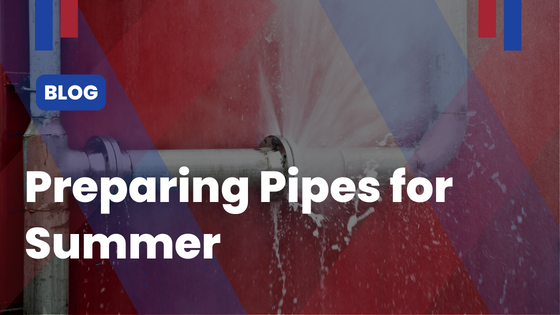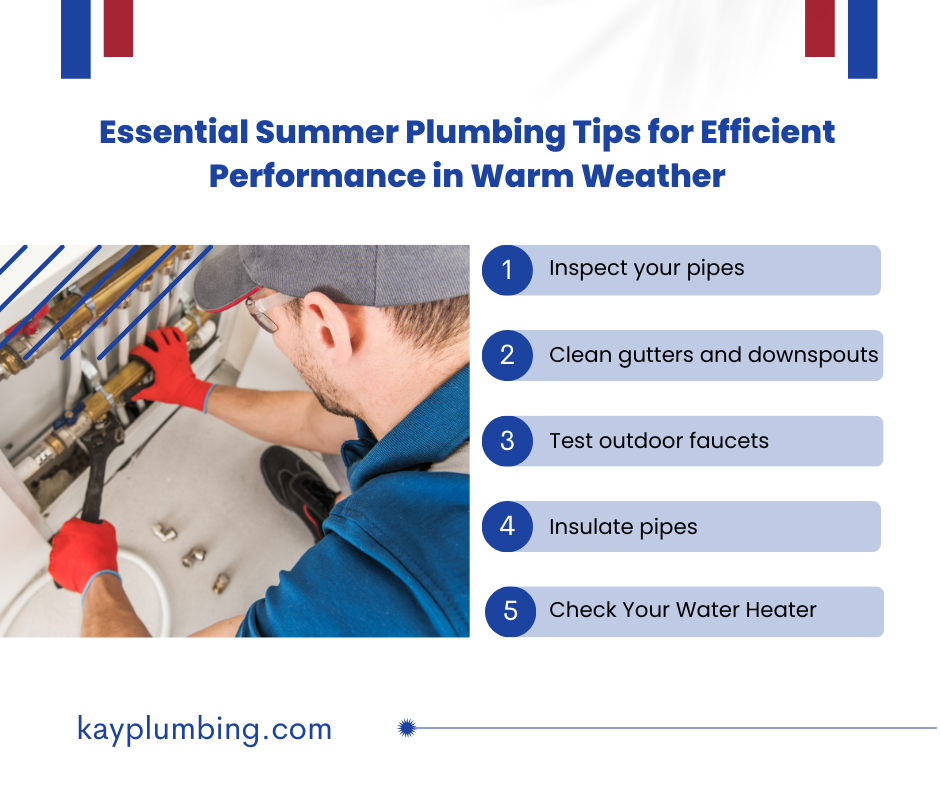With temperatures rising, it is essential to ensure that your plumbing systems are in good condition to withstand the season’s heat and increased water usage. The summer months can put a lot of stress on your home’s plumbing, with increased usage from outdoor activities such as watering plants, filling swimming pools, and washing cars. Hot temperatures can also cause water to expand and contract, potentially leading to leaks or burst pipes. So, preparing pipes for summer is a must.
Taking a little time now to perform some simple plumbing maintenance for summer will save you from the irritation and expense of dealing with unexpected repairs or emergencies.
Have a look at these summer plumbing tips to help ensure that your plumbing functions efficiently during warm weather:
1. Inspect your pipes: Check for any visible signs of damage, corrosion, or leaks. Pay close attention to exposed pipes, such as those in attics, basements, and crawl spaces, as they can be vulnerable to moisture and humidity. Be sure to look in your cabinets and under sinks to check for leaks and inspect the condition of hidden pipes. If you notice cracks, rust, or any other signs of failure, it’s important to address the issue as soon as possible to prevent further damage.
Look for signs of water damage around your home, such as damp spots on walls or ceilings, mold or mildew growth, or water stains. Inspect your faucets, valves, and fixtures for any visible leaks. If you notice any damage or leaks, contact a professional plumber to fix the issue before it becomes more serious.
2. Clean gutters and downspouts: It’s important to clean out any debris from gutters and downspouts to ensure that water flows freely away from your home. Clogged gutters can cause water to back up and overflow, potentially causing damage to pipes, walls, and landscaping.
Clear gutters will prevent water from pooling around your foundation or seeping into your basement, which can cause significant damage to your pipes and plumbing. Cleaning your gutters will also prevent standing water from attracting pests, such as disease-carrying mosquitoes.
Summer storms can put a lot of debris into your gutters and it’s best to keep an eye on them to ensure free-flowing drainage throughout the season.
3. Test outdoor faucets: Turn on outdoor faucets and hoses to check for any leaks or damage. Replace any worn washers or o-rings to prevent leaks. If you notice any leaks, be sure to address the issue as soon as possible to prevent wasting water and increasing your water bill, and avoiding potential water damage to your home. If you have a sprinkler system, check its connections and outlets as well.
4. Insulate pipes: Check your pipes for sweating. Sweating is an indication of the temperature difference between the water inside the pipe and the outside air. Hot temperatures can cause pipes to expand and contract, leading to damage or leaks. Insulating your pipes can help regulate the temperature and prevent them from getting too hot in the summer. Consider insulating pipes that are located in unconditioned spaces, such as attics, basements, or crawl spaces.
5. Check Your Water Heater: Your water heater may require some attention in preparation for spring and summer. Look closely at the tank and water heater’s pipes for any signs of leaks or corrosion. Then check the temperature setting. If it is set too high, consider turning the temperature down to save energy during the summer months.
Consider draining the tank to remove any sediment that may have accumulated at the bottom. This can help improve the efficiency of the water heater. Check the pressure relief valve to ensure it is functioning properly. This valve is designed to release pressure if it builds up in the tank and can help prevent damage or leaks. Be sure to turn off the power or gas supply to the water heater to ensure your safety while inspecting the unit.
Draining your water heater tank, checking its pressure valve, and removing sediment are all maintenance tasks that can be completed by a certified plumber. If you notice any issues, it’s best to call a professional to repair or replace the water heater. And if your water heater is older, consider replacing it with a more energy-efficient or tankless model. This can help save you money on your energy bills in the long run.
By taking proactive measures to prepare your pipes for summer, you can ensure that your plumbing system functions efficiently and effectively. If you have any questions, please reach out to the professionals at Kay Plumbing for expert solutions.


